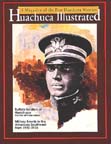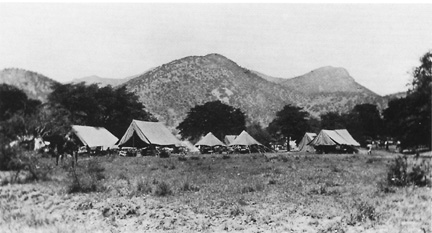 Huachuca
Illustrated, vol 1, 1993:
Huachuca
Illustrated, vol 1, 1993: Huachuca
Illustrated, vol 1, 1993:
Huachuca
Illustrated, vol 1, 1993:
chuca Illustrat
chuca Illustrat
Buffalo Soldiers at Huachuca:
Preserving Neutrality
chuca Illustrat
Second Lieutenant John B. Brooks, with D Troop, recalled in later years the flurry of activity that attended the 10th Cavalry's first year at Huachuca.
Very shortly after we arrived here, the neutrality situation on the border became very serious and very hot, so to speak, and the troops were rushed out to stations along the border, So at one time the only troops left back at the post were the band and pack train with a few odds and ends of that sort, the machine gun troop; well, that even went out. So, it was very hard to have anything except barest military necessities going on at that time. Then, things would quiet down, and we would be able to get more troops back on the post. Then there were quite a few full dress parades. It was a thrilling sight to see a thousand mounted out on this parade ground out here in the old blue dress uniform with yellow breast cord, and the band all mounted on white horses. The band was an excellent band, all soldiers, and they played very well and that was really a stirring sight.
The 10th was spread out along the border, with Fort Huachuca as its homebase. Brooks explained their area of responsibility.
You might say our territory covered from Douglas exclusively. We didn't have anything to do with the town of Douglas in any way, and our first troops were stationed at Forest Station, which is now Paul Spur and there is a big plaster mine or something there. And the next station was at, what was then called Osborn, now called Bisbee Junction, which is where the little spur comes down from Bisbee and hits the main line of what was then the EP&SW. Then, the most important station on the east end was Naco because that was the headquarters of the first squadron and there was always at least two troops at Naco and sometimes more. Then, the next station to the west would be Lochiel.
...And then the next was Nogales, and Nogales was quite an important station. We eventually were replaced by Infantry down there, but when we first came, we went to Nogales, and then our most western station was at a place called Arivaca, and then for a while we had one officer and about fifteen men at Yuma, but that didn't last very long and that was taken over by the First Cavalry.
At one time, when I was at Osborn, we sent a patrol out to the west to ride along from monument to monument along the border, and we went clear up to the Montezuma Pass, and that was the time of my life when I was in the best physical condition I've ever been in because I was doing over thirty miles every other day and loved it.
... So we were right out along the border in dugouts and things of that sort which we built ourselves just a few feet back from the International boundary where we would have a view and have the sentinels on duty all the time, and if we saw any Mexican troops trying to cross the line, we'd get out and warn them back. We had several men wounded at that time by stray shots coming into our camp, including a cook in our troop and two other men.

Naco, Arizona, in 1916, with the border customs station in the center of
the street. Photo courtesy Sergeant Paul Ballinger.
The general mission was to preserve neutrality. Now, then there was a bad situation right back over in here. This was ... pretty wild country... The Mexican bandits, that's all they were, they might be guised as rebel soldiers but they were nothing but out and out bandits. They would constantly raid across the line, and they would run off stock from these lonely ranches here. They didn't as a rule attack the ranchers, although there were a couple of instances when the rancher found out that they were driving his stock off where he went out and opened fire and then they usually greatly outnumbered him and they'd kill him. We sent several expeditions over in there to stay out for four or five days with pack-train and just patrol along that area. The squadron that I was in had two troops, A and C. We had a little brush with these fellows over there, but the minute that we opened fire they just went back across the line, and we had very strict orders not to follow hem back across the line. So, we never knew whether we ever even wounded any of them or not.
...I was out in the field 18 months.(36)
The monotony of vigilance along an uneasy border was inescapable. Much of the trooper's time was spent erecting shelter at remote border outposts. This Mexican Border song was sung around the time of the Punitive Expedition by men of the 10th Cavalry from Fort Huachuca:
-----Fust yo' take yo' rifle, and
den yo'take yo' pack,
-----An' yo' hike across de fields
and presume yo'comin'
back;
-----Skirmish to de left and
skirmish to de right,
-----An' mak' all de motions
and presume you' goin' to
fight;
-----Den yo' gets a shovel an'
a big ole pick,
-----An' spend the afternoon
makin' 'dobe brick;
-----Very nex' morning its de
same ole thing.
-----An yo' got seven yeahs to
do it in. (37)
While the regiment's mission along the border was to enforce the Neutrality Laws, just how those orders were to be carried out was often less clear to the troops who sought scraps of shade under the occasional Blue Paloverde along a vast vista of Southwestern desert. How the orders from the policy-makers back east filtered down to the tactical level was described to a 10th Cavalry officer by a longtime observer of the Arizona scene.
You see, Captain, it runs like this- ...The general commanding the department gits a letter from the Adjutant General and he says: "This office views with concern the fact that the troops under your command are not strictly enforcing the Neutrality Laws. You will at once take steps to see that this dereliction is corrected. Failure to do this will result in steps taken to ensure compliance with orders that have been frequently issued from these headquarters.
When the Ginral gits that he sets up. He's worried 'cause his wife's uncle's been elected to the Senate and he wants that uncle's aid in getting himself made a major ginral, so he sets down an writes to each colonel commanding a regiment and he says something like this:
"The attention of the Commanding General has been called to the fact that the regimental commanders in this department have been guilty of neglect of duty in not seeing to a proper enforcement of the Neutrality Laws. This will be corrected at once. Any failure on the part of officers will be held to be the fault of their regimental commanders."
Now o' course that makes every colonel mad. It ain't hard to make a colonel mad anyhow. They don't write letters in this case. They just say to the Adjutant, "Tell Captain Jones I want to see him." Then Jones comes and the colonel's mad. He wants to be a Brigadier Ginral hisself and he can't if he gets in trouble over them damn Neutrality Laws so he starts in on Jones.

Border guard at Naco, Arizona, 1st U.S. Cavalry, Troop G.
Left to right: Pvt. Caufield, Corporal Urbana, Pvt. George E. Maker.
Photo courtesy George E. Maker.
"Look here, Captain," he says, "you're going with troop on border duty. Part of that duty is to enforce the Neutrality Laws. That's the most important part. I only want to warn you that if you don't enforce those laws to the letter you'll find you've started something you can't finish. That's all."
Cap'n Jones goes out kind of in a whirl. He takes his troop to his station on the border and he reads his orders; then he calls in his Lieutenant and tells him just what the Colonel said on'y he puts in some words the colonel forgot.

A 1914 cavalry camp in the Huachuca foothills.
Lieutenant takes his men to the hellhole where he's to stay and he calls his sergeant n' tells him: "You take ten men today, Sergeant, and ride the border from Point O' Rocks to Sadler's Wells. You'll take note of all activities on the Mexican side of the line, especially any movement of troops and above all you'll see to it that the Neutrality Laws are strictly observed. Understand that?"
The Sergeant looks kind o' dazed. He's heard the words but they don't mean nothin' to him. So he says, "Yes sir. I'd like to ask the Lieutenant a question. What are these Neutrality Laws that we're to enforce?"
"How in hell do I know what they are?" says the Lieutenant. "All I can say is, 'you enforce 'em.'"
"Yes Sir," says the Sergeant and passes the same on to his corporal.(38)
As laughable as their ill-defined mission of preserving U.S. neutrality was to many of the men along the border, their presence was welcomed by the ranchers who repeatedly lost their stock, and sometimes their lives, to raiding Mexican gangs. It is unlikely, however, that the widely scattered picket line of the 10th Cavalry did much to inhibit the smuggling of arms from U.S. dealers to the several factions of Mexican malcontents.
Footnotes:
36. Brooks interview in Fort Huachuca Museum files.
37. Thisted, Moses N., "Mexican Border Songs and Ballads, 1916-17, " Military Collector and Historian, Vol. XXIV, No. 3, Fall 1974.